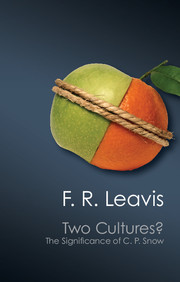Introduction
Published online by Cambridge University Press: 05 September 2013
Summary
‘There can be no two opinions about the tone in which Dr Leavis deals with Sir Charles. It is a bad tone, an impermissible tone.’ Lionel Trilling's magisterial judgement expressed a very widely held view. Both at the time and since, F. R. Leavis's critique of C. P. Snow's ‘The Two Cultures and the Scientific Revolution’ was and has remained a byword for excess – too personal, too dismissive, too rude, too Leavis. Whatever view they have taken of the limitations and confusions of Snow's original contentions – and Trilling, among others, itemized a good many – commentators on this celebrated or notorious ‘exchange’ (if it can be called that: there was little real give and even less take) have largely concurred in finding the style and address of Leavis's scathing criticism to be self-defeating. Aldous Huxley denounced it as ‘violent and ill-mannered’, disfigured by its ‘one-track moralistic literarism’. Even reviewers sympathetic to some of Leavis's criticisms recoiled: ‘Here is pure hysteria’.
‘It will be a classic’ was Leavis's own, surprisingly confident, judgement on his lecture. Though few of its early readers concurred – the lecture was more commonly seen as a classic example of intemperate abuse – with the passage of time the merits of its criticisms of Snow and what Snow represented have started to become better appreciated. In particular, the character of Leavis's performance and the genre to which it belongs have come into focus more clearly as the contingent elements of personality and newsworthiness have fallen away. Now, half a century after its initial delivery (as the Richmond lecture at Downing College Cambridge in 1962), it is appropriate to consider whether Leavis's lecture should indeed be seen as a minor classic of cultural criticism – a still pertinent illustration both of the obstacles faced by the critic who understands himself to be challenging a set of attitudes that are so widely shared and so deeply rooted as to seem to most members of that society to be self-evident truths, and of the discursive tactics and rhetorical resources appropriate to this difficult task. It is surely telling that both the pieces reprinted here have question marks in their titles, calling some piece of received wisdom or usage into doubt.
- Type
- Chapter
- Information
- Two Cultures?The Significance of C. P. Snow, pp. 1 - 49Publisher: Cambridge University PressPrint publication year: 2013

